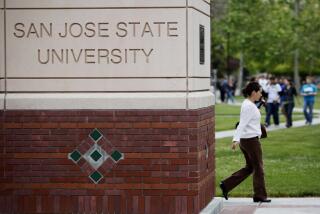Convicted Scholar Will Keep Hong Kong Job
BEIJING — The leaders of Hong Kong’s City University ruled Friday that a Chinese-born American scholar convicted of spying and deported from China late last month can retain his faculty position at the school.
The decision will allow 44-year-old Li Shaomin to resume his work as an associate professor of marketing at the university.
It also brought full circle one of recent history’s more bizarre cases of espionage--one that began with the mystifying arrest of a respected academic and gradually became a political embarrassment before ending with Li’s getting his old job back in the country he was convicted of spying against.
Amid intense public scrutiny, the university’s five-member executive committee agreed “that a disciplinary hearing not be held and . . . Dr. Li be allowed to continue with his current contract.”
“I’m glad about the decision,” Li said in a telephone interview from his home in Hong Kong. “It’s a good one for me and for the university. I’m hoping that I can now pick up where I left off.”
After being arrested in the border city of Shenzhen in February and languishing in detention throughout the spring and early summer, Li was tried quickly by a Beijing court, convicted and expelled from the country July 25. His release, along with that of two other Chinese-born U.S. residents also convicted of spying, came just before Secretary of State Colin L. Powell’s first trip to China and removed a major irritant in U.S.-Chinese relations.
After being reunited with his wife and 9-year-old daughter in the United States, Li declared his intention to return with his family to Hong Kong, where they have lived for the last five years. After a tense five-hour wait at Hong Kong’s international airport Monday, immigration officials allowed them to enter.
Hong Kong authorities are believed to have sought guidance from Beijing before admitting Li, although officials in neither city would confirm such contact.
Hong Kong, a longtime British colony, was returned to China four years ago under a formula known as “one country, two systems.” The formula established the territory as a special administrative region within China with considerable autonomy, including its own laws and de facto constitution, along with many democratic freedoms unknown to mainland Chinese.
But several incidents in recent months have left observers worried that the region’s political leaders are bending to pressure from Beijing and, in the process, gradually ceding the autonomy that has made Hong Kong such an attractive international commercial center. Because of this, Li’s reentry earlier in the week and Friday’s decision that he could resume his teaching job were carefully watched.
The decisions also have been viewed by political analysts as badly needed affirmations of Hong Kong’s special status.
“A rather spectacular example of Hong Kong’s autonomy,” declared a senior civil servant who requested anonymity.
Students and faculty groups at City University had lobbied for Li’s reinstatement as a sign of academic freedom.
But there were critics too.
Writing in Friday’s edition of the Hong Kong daily iMail, a local representative to China’s National People’s Congress argued that it would be illogical for Li to be allowed to resume his post.
“Can anyone explain why a man convicted of spying by a sovereign power and subsequently deported is allowed to reenter the same country in order to live and work there?” asked the representative, Ma Lik.
Li said he will have to rely on secondhand sources for now in conducting his research on China, but he said he has not given up on one day returning to the mainland.
“I really hope I can go to China again,” he said.
More to Read
Sign up for Essential California
The most important California stories and recommendations in your inbox every morning.
You may occasionally receive promotional content from the Los Angeles Times.










